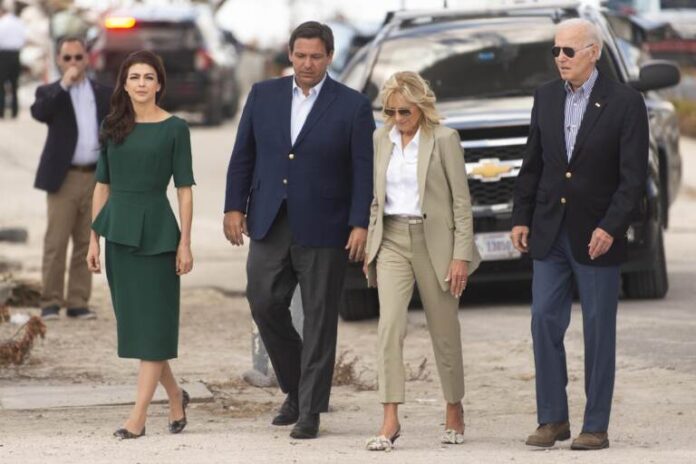

Upended palm trees, wrecked houses, and record-high flooding were all the hallmarks of a weather phenomenon that the Floridian peninsula was all too familiar with – Hurricane Ian. Hurricane Ian made landfall on Southwest Florida shores two weeks ago, leaving behind a trail of destruction and desolation in its wake. At least 137 people in the U.S. and Cuba have been reported dead, and the risk-modeling firm Risk Management Solutions (RMS) gives an estimate of a devastating $67 billion infrastructural damage.
In the aftermath of Hurricane Ian’s devastation, President Biden toured the city of Fort Myers Beach last Wednesday along with Florida Governor Ron DeSantis. Both men visited storm survivors and relief stations along the coastline, with Biden undertaking a helicopter ride surveying the effects of the tropical calamity.

Governor DeSantis and President Biden
DeSantis is widely considered a contender for the 2024 Republican presidential nomination and one of the President’s most vociferous critics, describing him as an “American Nero” who “hates Florida.” For his part, Biden has compared the forty-four-year-old governor to a schoolyard bully and accused him, along with other Republican politicians, of “playing politics with human beings.”
Yet, in striking contrast to the insults normally thrown between both sides, the pair offered a more conciliatory tone on Wednesday. In a press conference amid the ruins of leveled houses and streets, Biden and DeSantis partially praised each others’ responses to the crisis.
“And — but he — we’ve worked hand-in-glove. And he’s been on — things relating to dealing with this crisis, we’ve been completely in lockstep.” “There’s been no differences,” Biden said. DeSantis personally thanked the President and his administration for its coordination on disaster relief.

The moment provided observers with a much-needed break from the policy fights and disputes characteristic of the current political atmosphere. In the lead-up to the upcoming midterm elections, national Democrats and Republicans have both embraced and infused the partisan climate with aggressive rhetoric and name-calling. Governor DeSantis’ own campaign ads seek to negatively tie his opponent in the gubernatorial election to the president.
Biden has also met with the area’s local congressman, Rep. Byron Donalds (R), who posted on Twitter his delight in welcoming the president, proclaiming that “before Republicans and Democrats, we are Americans.”
Even throughout the short truce, Governor DeSantis and President Biden both took to lauding their own achievements. Biden celebrated his efforts to establish a $200 million dollar electrical “smart grid” system, to which he partially credits the disaster recovery. DeSantis spoke of “cutting red tape” and eliminating bureaucratic hurdles in the way of relief efforts.

FLEETING UNITY
Nevertheless, to anyone interested in the return of civil politics in the U.S, the union of these two political rivals is a welcoming sign that overcoming the modern public divide is still possible. Politicians from across the country have banded together in support of the people of Florida in a fleeting moment of national unity.
The keyword here, however, is “fleeting.” Commentators seem to agree that feelings of reconciliation and solidarity will not last after the end of the news cycle. Many issues of contention remain largely unresolved, meanwhile, political actors design in increasing already rising tensions.
Another important thing is DeSantis’ recent decision to fly refugees from Florida to Martha’s Vineyard in Massachusetts, a destination that was intentionally targeted due to the area’s political leanings. Earlier last week, it was revealed that officials from the Florida government lied to these refugees as to where they were headed and if they would be receiving jobs. Immigration lawyers and activists have decried the policy as cruel and inhumane, and there have been calls on the Department of Justice to investigate DeSantis on this basis. However, the practice is set to continue, with the Republican-controlled state governments of Texas and Arizona participating as well. In fact, last month, Governor Greg Abbott of Texas announced the busing of migrants from Texas to the US Naval Observatory, the residence of the US Vice President in Washington DC.
However, the federal government is also frequently condemned for its role in the border crisis. The administration appears to ignore the ever-growing requests of border states to alleviate their communities with relief. Critics say that Biden’s own inaction and refusal to engage with state governments surely must have, at least partially, caused the discussion on immigration to reach these new levels of showmanship.
Both claims are correct. If America wishes for a return to times of normalcy and not to continue on a path of chicanery and political underhandedness, we must start building consensus in this country. Although it is often repeated by public figures, ending these threats to our democracy begins with seeking common ground and not grounding our beliefs and words with volatile emotion. In conclusion, it will take more than Hurricane Ian to unite this nation and attain bipartisanship.
Stay tuned to The Roundup for more information and coverage of the latest political news.





